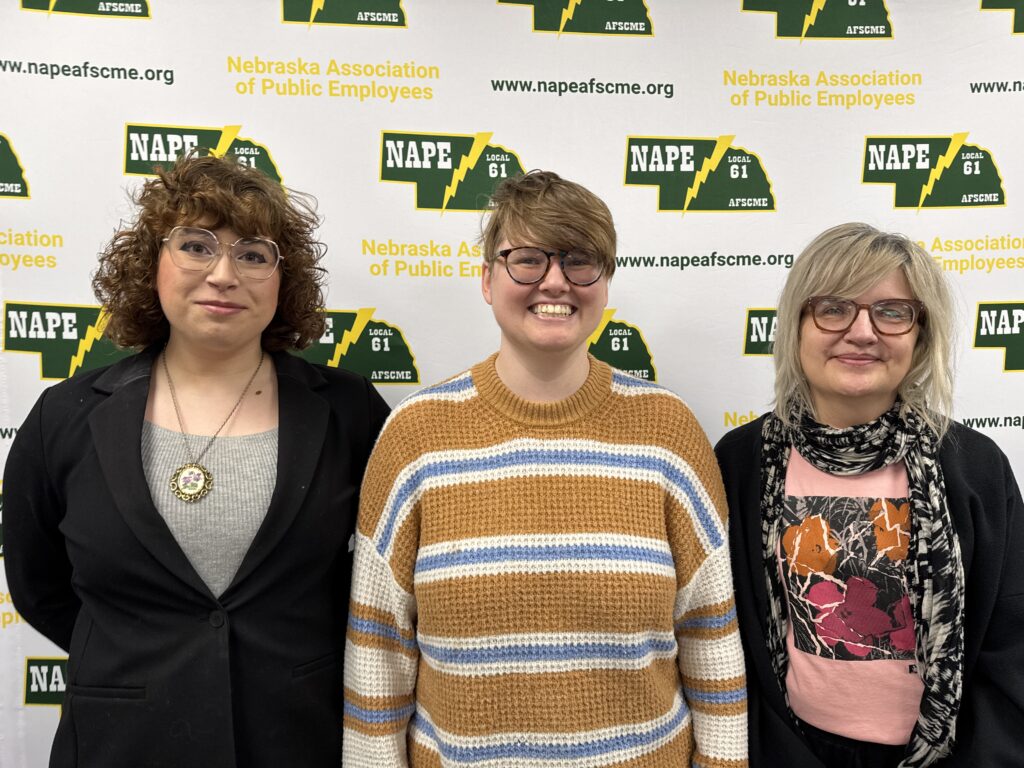Nebraska’s libraries, especially those in rural communities, are bracing for potential funding disruptions following the federal government’s efforts to gut the Institute of Museum and Library Services (IMLS). While Nebraska has yet to experience direct cuts, NAPE/AFSCME members in library positions are sounding the alarm over the uncertainty surrounding future support.
The Nebraska Library Commission (NLC) relies on federal IMLS funds for roughly 25% of its budget, with the remaining 75% coming from state sources. Federal dollars are vital for a range of programs, including library staff wages, Nebraska eReads, talking book and braille services, interlibrary loan compensation, and technology access programs like NebraskAccess.
“If IMLS says, ‘No one’s getting any money,’ these programs won’t disappear overnight, but libraries will have to scramble for funding that they might not have,” explained NAPE member Hollin Attendola, a Reader Services Advisor at the Nebraska Library Commission. “Rural libraries or poorer counties would likely have a much tougher time.”
One of the most significant programs at risk is the Nebraska Talking Book and Braille Service, which provides audiobooks and braille books to Nebraskans who are blind, low-vision, or otherwise print-disabled.
“Our service here in Nebraska is almost entirely funded by IMLS; a little over half a million dollars from their grants are directed to us,” Attendola said. “We serve around 2,500 patrons statewide, from Lincoln and Omaha to Gering and Scottsbluff. That includes seniors losing their sight to macular degeneration, individuals with dyslexia, and even traumatic injury survivors. A loss of funding would make continuing these services at the same level incredibly challenging.”
The most vulnerable institutions are Nebraska’s rural libraries, many of which rely heavily on federal grants to cover basic operations like staffing, programming, and even keeping their doors open.
“I’m really worried about rural libraries,” said NAPE member Mackenzie Marrow, an assistant curator at the NLC. “They don’t have the tax base of Lincoln or Omaha. If interlibrary loan compensation goes away, they lose vital reimbursement for postage and administrative costs. No single library can afford every book for every patron.”
Interlibrary loan (ILL) is a crucial resource that allows smaller libraries to borrow materials from larger systems, ensuring all Nebraskans have equitable access to library services. For homeschool families, students in research competitions, and rural residents alike, these services are essential.
AFSCME joined forces with the American Library Association (ALA) to file a lawsuit against the federal government’s decision to dismantle IMLS. Read more about our IMLS lawsuit here. On May 1, we won a temporary restraining order blocking the firing of staff and withholding of grants.
“That was really big for us,” said NAPE/AFSCME member Lynda Clause, an Administrative Technician at NLC. Marrow added, “It felt like nobody noticed when this happened. It was buried in executive orders with other bureaucratic changes, but knowing our union had our backs really gave us hope.”
Our members emphasized that public advocacy is essential. “Use your local library,” urged Marrow. “Walk through the door, check out a book, browse. Every visit counts when libraries are defending their budgets. And tell your elected officials, say no to any cuts to IMLS funding.”
NAPE/AFSCME remains committed to standing up for our members, ensuring that when our work and the vital services we provide come under attack, we are ready to fight back.
State Budget Update: Salary Funding Expected to Pass, Insurance Rates Increase
Beginning on May 6, 2025, the Nebraska Legislature will begin floor debate on the 2025-2027 biennium state budget. The budget bills, LB261 through LB 264 were advanced by the appropriations committee and will be debated and amended by state senators in order to pass a balanced budget by May 15, 2025.
Prior to advancing the budget bills, the appropriations committee faced a $396 million dollar deficit. The committee cut that deficit by approximately $133 million when the legislature passed a pair of bills to roll back tax incentives and teacher retirement plan contributions. The legislature still has significant work to do to balance the overall budget.
In a win for union members, the appropriations committee recommended funding all the salary increases that NAPE/AFSCME members negotiated at the bargaining table with the Governor’s office. This includes a total increase of $82,226,684 in salary increases for all state employees over the biennium.
The appropriations committee is also recommending an increase in funding for state employee health insurance costs by 11% in each year of the biennium. This is a significant increase from recent years. You can read more about the historic insurance increases here.
Open enrollment is taking place in May. Health insurance rates will increase 8% for state employees on regular insurance plans, and 11% for wellness plans. While this is a higher than usual increase, it’s important to put the rate increases in the context of actual dollar cost.
A state employee on regular single coverage insurance will see their cost increase $7.27 per paycheck. A state employee on regular full family coverage will see their cost increase $25.84 per paycheck. The state is self insured, and our claims pool saw a significant increase in catastrophic claims in the past year which led to higher than usual increases.
Our union will continue to monitor the budget debate carefully, but we expect all salary increases to be funded by the legislature and signed into law by the governor.
